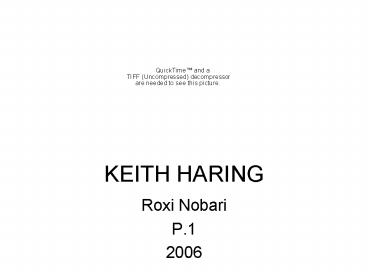KEITH HARING - PowerPoint PPT Presentation
1 / 9
Title:
KEITH HARING
Description:
Since I was little, I had been doing cartoons, creating characters and stories. ... I studied semiotics, the science of signs and symbols.' Elements: ... – PowerPoint PPT presentation
Number of Views:982
Avg rating:3.0/5.0
Title: KEITH HARING
1
KEITH HARING
- Roxi Nobari
- P.1
- 2006
2
Untitled, 1983
...My father made cartoons. Since I was little,
I had been doing cartoons, creating characters
and stories. In my mind, though, there was a
separation between cartooning and being an
'artist'..."
Elements Shape, texture, planes,
color Principles Balance, unity, variety,
repetition, movement
3
Untitled, 1984
If I was going to draw, there had to be a
reason. That reason, I decided, was for people.
The only way art lives is through the experience
of the observer. The reality of art begins in the
eyes of the beholder and gains power through
imagination, invention, and confrontation.
Elements Shape, texture, color Principles Balan
ce, proportion, unity, variety, repetition
4
Statue of Liberty, 1980
The images are part of the collective
consciousness of modern man. Sometimes they stem
from world events, sometimes from ideas about
technology or people changing roles in relation
to God and evolution. All of the drawings use
images that universally readable. They are are
often inspired by popular culture.
Elements Shape, texture, space, planes, value,
color Principles Balance, proportion, unity,
repetition, movement
5
Untitled, 1981
For two years, I was an observer. During that
time, my art was going through several changes. I
began making videotapes and doing performances. I
was introduced to the work of William Burroughs
and began experimenting with words and meaning in
a similar style. I studied semiotics, the science
of signs and symbols.
Elements Shape, texture, space, planes, value,
color Principles Balance, unity, variety,
repetition, movement
6
Untitled (Figure on Baby), 1987
When I was eighteen, my work, which had been
primarily cartoon-oriented, became increasingly
abstract and concerned with spontaneous action.
Elements Shape, space, planes, value,
color Principles Balance, proportion, unity,
variety, movement
7
Untitled, 1985
Art should be something that liberates
your soul, provokes the imagination and
encourages people to go further.
Elements Shape, planes, value,
color Principles Balance, proportion, unity,
repetition, movement
8
Biography
- Born May 4, 1958, Died February 16, 1990 of AIDS
related complications(he was 31) - Born in Reading, Pennsylvania, grew up in
Kutztown - From 1976 to 1978 he studied graphic design at
The Ivy School of Professional Art - He achieved his first public attention with his
chalk drawings in the subways of New York
(graffiti style) - He contributed in the New York New Wave display
- he had his first exclusive exhibition in the Tony
Shafrazi Gallery - In 1985 he began to paint canvas. Simultaneously,
the Museum of Modern Art in Bordeaux opened an
exhibition of his works, and he took part in the
Paris Biennial - Haring's imagery has become a universally
recognized visual language of the 20th century - The Keith Haring Foundation, established in 1989,
continues Keith's legacy of giving to children's
organizations. - In June 1989, on the rear wall of the convent of
the Church of Sant'Antonio in Pisa, he painted
the last public work of his life, the mural
"Tuttomondo - he established the keith haring foundation to
provide some funding and imagery to AIDS
organizations and childrens programs.
9
WORKS CITED
- http//www.haring.com/art_haring/index.html
- http//www.haring.com/cgi-bin/essays.cgi?essay_id
01 - http//leland.sjusd.org/7Edimerson/research/artis
tlist.html - http//en.wikipedia.org/wiki/Keith_Haring
- http//www.fineoldart.com/browse_by_essay.html?ess
ay298 - http//www.designboom.com/history/haring.htmlbs.ma
rketwatch.com/






























